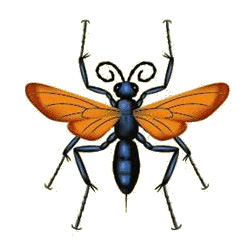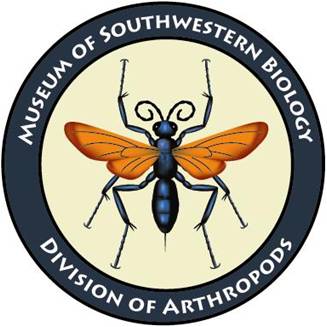Division of Arthropods Policy
General Operating Policy
The Division of Arthropods follows the same general museum policies as outlined for the entire Museum of Southwestern Biology. Additional policies specific to the Division of Arthropods are listed below.
Loan Policy and Process
The Division of Arthropods provides the loan of specimens to researchers who wish to examine arthropod specimens representing specific taxa. All loans are for one year unless other arrangements are made with a Collection Manager or the Curator. Loans may be extended for another year by contacting a Collection Manager and requesting an extension. All loans must be returned by the due date unless other arrangements have been made with a Collection Manager. If loans are not returned, or specimens are returned damaged without good cause, then future loan requests to the borrower will be denied.
The steps to requesting and receiving a loan are as follows:
-
Send an e-mail or a letter addressed to the Collection Manager, Division of Arthropods, MSB, to request specimens. Requests may also be addressed to the Curator. The request letter must state: 1) The names of the specific taxa requested, including Order, Family, Genus and Species (or to lowest rank of interest), 2) The exact geographic region(s) of interest, 3) The purpose of the loan; what research will the specimens be used for, how will the specimens be handled and used, 4) Name and address of the facility where the specimens will be kept, 5) Provide the name of the person who will be responsible for the specimens, along with contact information (e-mail, phone number), and 6) Provide a mailing address to which the loan should be mailed. Only written requests providing all of the above information will be considered for loans.
-
The Collection Manager and/or Curator will approve or deny the loan depending upon the information provided in the written request, and relative to the availability of specimens in the collection representing those taxa and geographic locations. If the loan is approved, and specimens of requested taxa are available, the Collection Manager will prepare and mail the loan, along with a completed hard-copy loan form, and the Collection Manager will send an e-mail copy as well. Expect at least one to two weeks for loan requests to be completed.
-
Upon receipt of the loan, the borrower should immediately inspect the specimens to: 1) make sure that the specimens match the list of specimens on the loan form, and 2) make sure that the condition of the specimens matches the condition noted on the loan form. The borrower should then complete the four lines of information near the bottom of the form, beginning with Borrower's Comments, and ending with the Borrower's Signature. Sign both forms, mail or e-mail one back to the division, and retain the other.
-
All loans are for one year. The borrower may make arrangements with the Collection Manager for a loan of more than one year. The borrower may also contact the Collection Manager sometime later, but one month prior to the one-year due date to request a one-year extension. A separate loan extension form will be prepared by the Collection Manager for each loan extension.
-
The condition of all specimens will be evaluated by the Collection Manager at the time that the loan is prepared. All specimens must be returned in the same condition.
-
Borrowers of specimens may not dissect or re-mount specimens unless previous arrangements have been made with the Collection Manager (to be noted in the comment field of the loan form).
-
New determination labels may be added to the specimens, but the original old labels must be returned with the specimens, including the green UNM specimen loan number label.
-
All loans must be returned by First Class US Mail, or by equivalent or faster commercial transportation service (e.g., FedEx). All loans must be properly packaged, as received by the borrower from the MSB. Please retain the original shipping box and packing materials that the loan arrived in, and repack the specimens as they were packed when they arrived, and be sure to place packing materials between the specimen containers and the outer shipping box. If a loan is not returned by the due date, the Collection Manager will send a notice to the borrower, requesting the return of the loan, or an extension of the loan. Please respond promptly to this notice, and consider renewing the loan if necessary.
-
If another person requests specimens that are currently on loan, the borrower will be contacted by the Collection Manager, and asked to return the loan. Depending upon the circumstances and need, the Curator will decide whether or not to extend the loan to the original borrower, or request that the specimens be returned for the second borrower.
-
Borrowers who abuse Division of Arthropods loan policies will be denied future loans.
Museum Specimen, Literature, and Equipment Accessions/Donations
The Division of Arthropods accepts arthropod specimens, equipment, and literature from individuals and institutions for incorporation into the museum. Specimens from the American Southwest and from northern Mexico are given priority for acquisition into the arthropod collection and database. All specimens must be properly labeled (see Specimen Label Instruction Form), or at least in series with proper locality labels. All specimens also must be properly preserved, including those pinned, or those mounted on microscope slides, or preserved in 70% ethanol. People wishing to donate arthropod specimens must first contact the Curator or a Collection Manager. The specimens will be evaluated for acceptance. Specimens accepted for acquisition will be incorporated into the arthropod collection, and label information will be incorporated into the arthropod specimen database.
Accession of specimens and materials follow the general MSB accession policy guidelines, including the legal and ethical considerations. Specimens of taxa that are protected by law, or obtained from lands that require collecting permits, must be accompanied by copies of the appropriate legal permits.
UNM program, project and individual research collection specimens housed in the Division of Arthropods may eventually be accessioned into the division’s collection, or may be removed and housed in other museums once the particular research project has terminated. All research collection specimens incorporated into the Arthropod collection may be tracked through the specimen database. The accession of research collections must be approved by the Collection Manager. In general, all research collections housed in the Arthropod Division will eventually be incorporated into the arthropod collection.
Non-specimen items such as arthropod literature, field collecting equipment, or museum equipment will be evaluated and accepted depending upon condition and museum needs. All literature and equipment donation requests should be made to the Curator or a Collection Manager. Make arrangements with a Collection Manger to borrow entomological supplies.
Once specimens, literature, or equipment have been donated to the Division of Arthropods, the donator will receive a formal letter of acknowledgement from the Curator or from the Collection Manager if requested by the donor. Donations to the Division of Arthropods are permanent agreements, and donated materials will not be returned to the owner.
The Division of Arthropods does not provide monetary value estimates of donated specimens or materials for personal tax purposes. Individuals who donate materials to the museum may obtain monetary estimates elsewhere, but not from the division.



